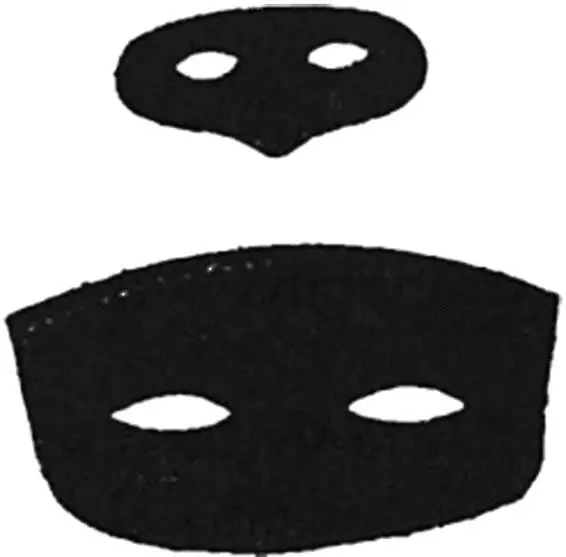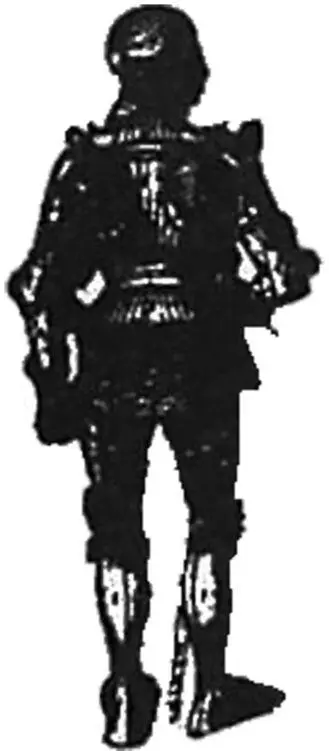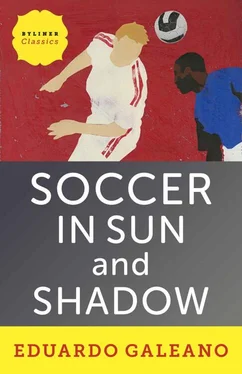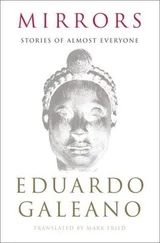In 1993 and 1994 the directors of several soccer teams around the world were charged and prosecuted for swindles of various sorts. Evidently soccer is useful not only for hiding social tensions and evading social conflict, but also for hiding assets and evading taxes.
The days are long gone when the most important clubs in the world belonged to the fans and the players. In those remote times, the club president went around with a bucket of lime and a brush to paint the lines on the field, and as for directors, their most extravagant act was footing the bill for a celebratory feast in the neighborhood pub. Today clubs are corporations that move fortunes to hire players and sell spectacles, and they have grown accustomed to tricking the state, fooling the public and violating labor rights and every other right. They are also used to impunity. There is no multinational corporation that enjoys greater impunity than FIFA, the association of professional clubs. FIFA has its own justice system. Like the Queen of Hearts in Alice in Wonderland, FIFA’s unjust system sentences first and tries later, so there will be plenty of time to cover up.
Professional soccer operates at the margins of the law, in a sacred territory where it can dictate its own laws and ignore all others. But why should the law operate at the margins of soccer? Judges rarely dare to red-card the big clubs for cooking the books to score illegal goals on the public treasury and leave the rules of clean play sprawled on the ground. The fact is judges know they risk a sharp whistle if they use an iron hand. Professional soccer is untouchable because it is popular. “The directors steal for us,” say the fans, and they believe it.
Some judges are prepared to defy the tradition of impunity, and recent scandals have at least shone a little light on the financial acrobatics and shell games that some of the richest clubs in the world play as a matter of course.
When the president of the Italian club Perugia was accused of buying referees in 1993, he counterattacked by charging, “Eighty percent of soccer is corrupt.”
Experts agree he was being generous. Every important club in Italy, from north to south, from Milan and Torino to Napoli and Cagliari, is involved in fraud, some more, some less. Their falsified balance sheets hide debts several times the value of their capital; the directors maintain slush funds, phantom companies, and secret Swiss accounts; instead of taxes and social security they pay hefty bills for services not rendered; and the players tend to pocket a lot less money than the books say they receive, as it gets lost along the way.

The same tricks are common among the most well-known clubs of France. Several directors of Bordeaux were charged with embezzling funds for personal use, and the head honchos of Olympique de Marseille were taken to court for bribing their opponents. Olympique, the most powerful club in France, was knocked down to second division and lost the titles of champion of France and champion of Europe when its directors were caught bribing several players from Valenciennes just before a match in 1993. That episode put an end to the sporting career and political ambitions of the businessman Bernard Tapie, who got a year in prison and ended up bankrupt.
At the same time, the Polish champion Club Legia lost its title for having “arranged” two matches, and Tottenham Hotspur in England revealed that it had been asked to make payments under the table to obtain a player from Nottingham Forest. The English club Luton, meanwhile, was being investigated for tax evasion.
Several soccer scandals erupted simultaneously in Brazil. The president of Botafogo charged that the directors of Brazil’s professional league had manipulated seven matches in 1993, winning a small fortune in bets. In São Paulo other lawsuits revealed that a local soccer federation boss had grown rich overnight, and when certain phantom accounts were examined it became clear that his sudden fortune did not result from a life devoted to the noble calling of sport. As if that were not enough, the president of the Brazilian Soccer Confederation, Ricardo Teixeira, was sued by Pelé for taking bribes in the sale of television broadcast rights. In response to Pelé’s suit, Havelange named Teixeira, who is his son-in-law, to the FIFA board.
Nearly two thousand years before all this, the biblical patriarch who wrote the book of Acts told the story of two early Christians, Ananias and his wife Sapphira, who sold a piece of land and lied about the price. When God found out, he killed them on the spot.
If God had time for soccer, how many directors would remain alive?


The Mayas of Chiapas were up in arms, the real Mexico blowing up in the face of the official Mexico, and Subcomandante Marcos was astonishing the world with his words of humor and amour.
Onetti, the novelist of the dark side of the soul, lay dying. World car-racing champion Ayrton Senna, a Brazilian, was being decapitated on an unsafe European track. Serbs, Croats, and Muslims were killing each other in the pieces that had been Yugoslavia. In Rwanda something similar was happening, but television spoke of tribes, not peoples, and implied that the violence was the sort of thing black people do.
Torrijos’s heirs were winning the Panamanian elections four years after the bloody invasion and useless occupation by the United States. U.S. troops were pulling out of Somalia, where they had fought hunger with bullets. South Africa was voting for Mandela. Communists, rebaptized as socialists, were winning the parliamentary elections in Lithuania, Ukraine, Poland, and Hungary, all countries which had discovered that capitalism also has certain inconvenient traits. But Moscow’s Progress Publishers, which used to publish the works of Marx and Lenin, was now publishing Reader’s Digest . Well-informed sources in Miami were announcing the imminent fall of Fidel Castro, it was only a matter of hours.
Corruption scandals were demolishing Italy’s political parties and filling the power vacuum was Berlusconi, the parvenu who ran the dictatorship of television in the name of democratic diversity. Berlusconi was crowning his campaign with a slogan stolen from the soccer stadiums, while the fifteenth World Cup got under way in the United States, the home of baseball.
The U.S. press gave the matter scant attention, saying more or less: “Here, soccer is the sport of the future and it always will be.” But the stadiums were packed despite a sun that melted stones. To please European television, the big matches were played at noon, as in Mexico at the ’86 Cup.
Thirteen teams from Europe, six from the Americas, and three from Africa took part, plus South Korea and Saudi Arabia. To discourage ties, three points were given for each win instead of two. And to discourage violence, the referees were much more rigorous than usual, handing out warnings and ejections throughout the tournament. For the first time the referees wore colorful uniforms and for the first time each team was allowed a third substitute to replace an injured goalkeeper.
Maradona played in his final World Cup and it was a party, until he was defeated in the laboratory that tested his urine after the second match. Without him and without the speed demon Caniggia, Argentina fell apart. Nigeria played the most entertaining soccer of the Cup. Bulgaria, Stoitchkov’s team, won fourth place after knocking the fearful German squad out of the running. Third place went to Sweden. Italy faced Brazil in the final. It was a boring, drawn-out affair that ended scoreless, but between yawns Romario and Baggio offered some lessons in good soccer. In the penalty shootout, Brazil won 3–2 and was crowned champion of the world. An amazing story: Brazil is the only country that qualified for every World Cup, the only country to win it four times, the country that has won the most matches, and the country that has scored the most goals.
Читать дальше















